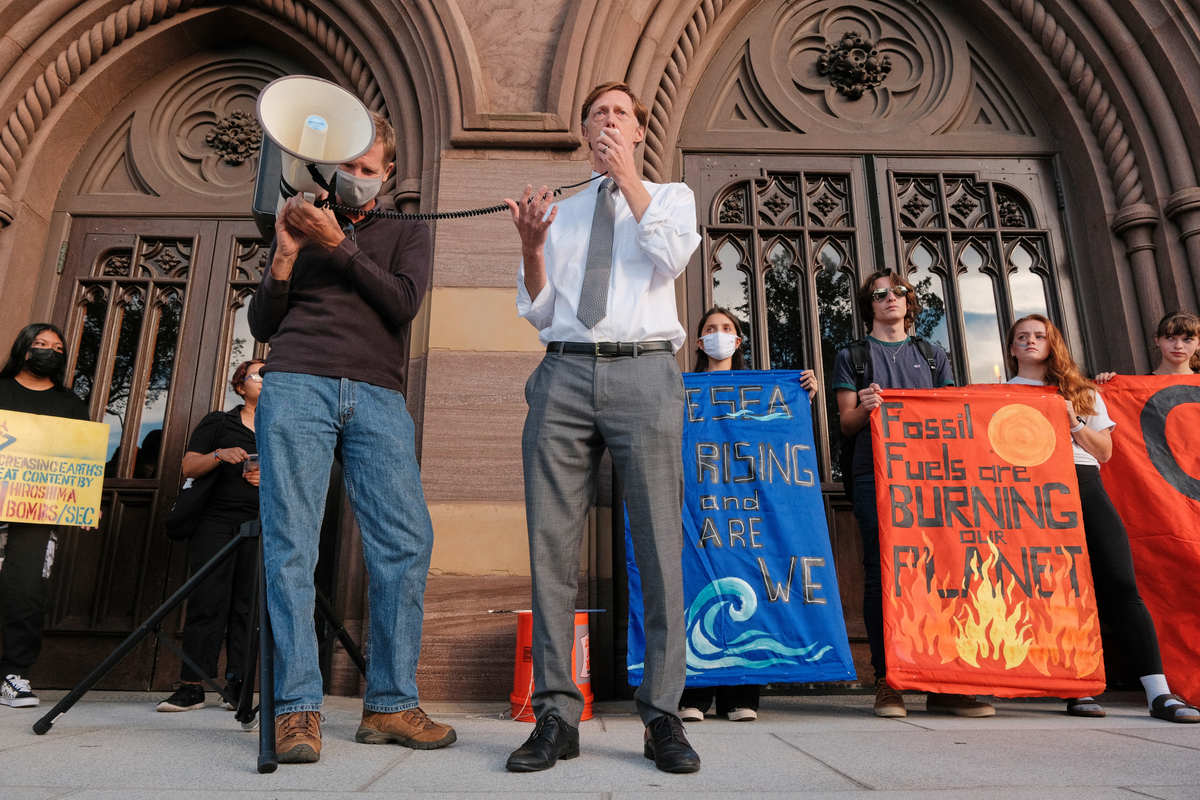Updated Yale Climate Opinion Maps reveal city’s climate priorities
The Yale Program on Climate Communication released a comprehensive 2021 report on Americans’ climate change beliefs, risk perceptions and support for climate policies at the state, congressional district, metro area and county levels.

Lukas Flippo, Senior Photographer
Yale researchers have found that 75 percent of adults in New Haven’s 3rd Congressional District believe that climate change is happening, a higher mark than the 72 percent of Americans that believe in its existence.
The Yale Program on Climate Change Communications, or YPCCC, updated its Climate Opinion Maps, which highlight climate opinions by state and locality, with data collected in 2021. The new maps shed light on how New Haveners perceive the climate crisis and their opinions on public policies to solve it. The research team for these maps consists of Jennifer Marlon, Liz Neyens GRD ’15, Martial Jefferson ’11, Seth Rosenthal, Peter Howe and Matto Mildenberger GRD ’16.
“Public opinion is key to addressing climate change,” Marlon, a lecturer at the Yale School of the Environment and the Yale Program on Climate Change Communication, wrote in an email to the News. “If we don’t have a majority of the public prioritizing the issue, there is little motivation for politicians to focus on making cheap, clean energy more accessible, cleaning up our transportation system so we’re not breathing toxic air in our cities, cleaning up and strengthening our infrastructure to protect our communities, the health of our children, and much more. Our new maps show what the public thinks and, critically, *where* they think it.”
The updated maps also reveal that 70 percent of adults are worried about global warming in Connecticut’s Congressional District 3, which includes New Haven and the surrounding cities of Milford and Hamden. Congressional District 3 is the second-most concerned district in the state, ranking behind Connecticut’s Congressional District 4, where 75 percent of adults are worried about global warming.
However, only 47 percent of surveyed New Haven residents report personally experiencing the effects of global warming.
And only 35 percent of surveyed New Haveners report hearing about global warming in the media at least once per week.
“It is concerning that people aren’t hearing about climate change more in the media in Connecticut given our coastal location and vulnerability to storms, sea level rise and flooding,” said Chris Schweitzer, an activist and director of the New Haven Leon Sister City Project.
These maps also reveal where New Haveners stand on climate-related public policy.
In Connecticut’s Congressional District 3, 81 percent of surveyed adults support funding research into renewable energy sources. Seventy-six percent support regulating CO2 as a pollutant, and 71 percent support setting strict CO2 limits on existing coal-fired power plants.
Another 81 percent of respondents support tax rebates for people who purchase energy-efficient vehicles or solar panels, and 68 percent support requiring utility companies to produce 20 percent of their electricity from renewable sources.
Only 29 percent support drilling for oil in the Arctic National Wildlife Refuge, and 48 percent support the expansion of oil and gas drilling off the US coast.
On the issue of education, 80 percent believe that schools should teach about the causes, consequences and potential solutions to global warming.
“Most people underestimate just how much support for climate action exists in their community,” YPCCC Director of External Partnerships Joshua Low added. “Elected officials use the maps to understand what climate opinion is in their districts –– something that policymakers often underestimate.”
When asked about who should address climate change, 73 percent of New Haven respondents believed that corporations should do more to address the crisis. Sixty-nine percent feel that citizens should be more responsible, while 66 percent think Congress should do more. Fifty-nine percent feel that Governor Ned Lamont should do more to address global warming.
Neyens, a research data analyst for the Yale Program on Climate Change Communication, emphasized the importance of public opinion surveys at the local level.
“Surveys are expensive to conduct and so there aren’t many data available at the subnational level. And so the analysis that the climate opinion map does allows us to understand public opinion at the sub-national level,” Neyens said. “And then that can be used by any person who’s interested in understanding public opinion in their region.”
The Yale Climate Opinion Maps were created in 2014.







